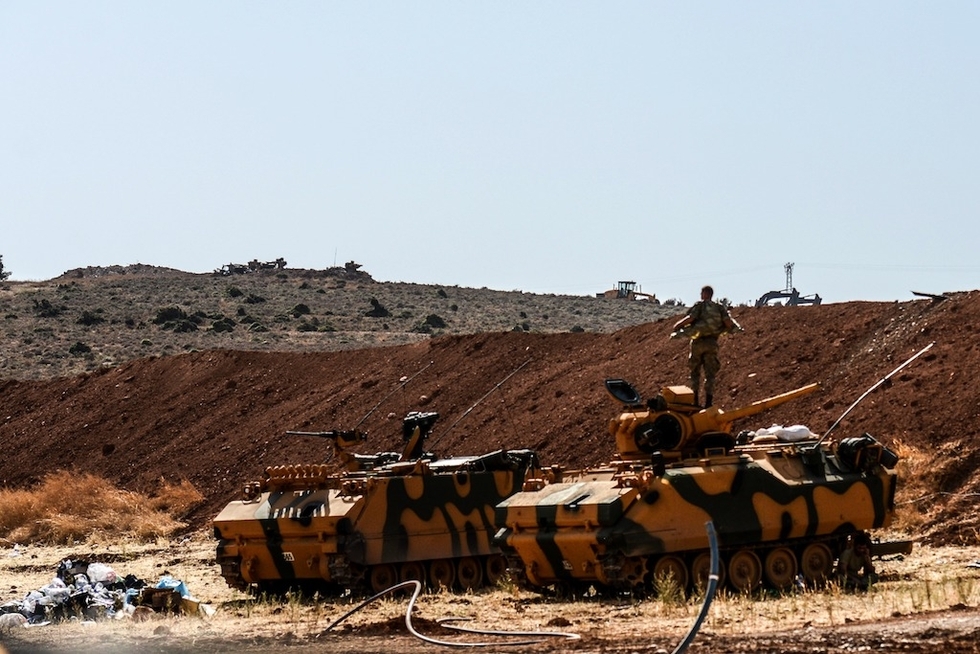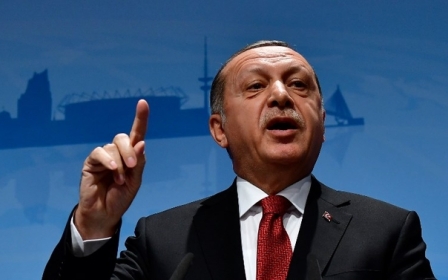Turkey, militants clash as Erdogan vows to destroy 'terror corridor' in Syria

Turkish troops on Sunday exchanged fire with Syria-based militants as Ankara massed military vehicles on the frontier ahead of an expected operation to oust al-Qaeda's former Syrian affiliate from Idlib province.
President Recep Tayyip Erdogan on Saturday announced the launch of an operation by pro-Ankara Syrian rebel forces, backed by the Turkish army, to reimpose security in Idlib.
Most of the northwestern region is controlled by Hayat Tahrir al-Sham (HTS), a group led by al-Qaeda's former Syria affiliate, which ousted more moderate rebels in recent months.
Turkey has massed special forces and military hardware including tanks on the border but the operation has yet to begin in earnest, monitors and sources on the ground said.
Turkish forces fired seven mortars over the border with the aim of easing the passage of the pro-Ankara Syrian forces, the Dogan news agency reported.
Turkish forces have also been seen removing parts of the security wall Ankara has built on the border so that military vehicles can pass through into Syria.
Pro-government media said that the operation was now into its second day, and it was not immediately clear what the Turkish military's next move would be.
'HTS warns'
On Sunday morning, HTS militants opened fire on Turkish forces removing part of a wall along the border between Turkey and Idlib, witnesses and the Syrian Observatory for Human Rights monitor said.
The Observatory reported "heavy exchanges of fire," but said the incident did not appear to mark the start of the operation Erdogan described on Saturday.
Turkish armoured vehicles and troops were waiting on the border, from where smoke could be seen from the mortar fire, an AFP photographer said.
Television images showed locals in the Turkish border town of Reyhanli in Hatay province cheering as more armoured vehicles were driven through the town overnight.
Ankara appears keen to oust the HTS from Idlib in order to create a de-escalation zone into which it can send military monitors to implement a ceasefire.
Turkey, along with Syrian government allies Russia and Iran, earlier this year agreed a deal to implement four such ceasefire zones in Syria as a prelude to talks on a peace deal.
The zone encompassing Idlib is the last one to go into effect, and its implementation has been held up by fierce opposition from HTS.
On Saturday, the group warned "treacherous factions that stand by the side of the Russian occupier" should only enter the area if they want "their mothers to be bereaved, their children to be orphaned, their wives to be widowed".
However, video footage released on social media appeared to show HTS escorting Turkish-backed forces into Idlib:
Mostafa Mahamed, a former spokesperson for HTS, suggested that there were ongoing negotiations between Turkey and HTS.
"Turkey doesn't want a war on the borders. HTS doesn't want to/can't fight Turkey," he tweeted on Sunday.
"Both are willing to talk. These are facts."
'Tomorrow Afrin'
Turkey earlier this year wrapped up its half-year Euphrates Shield operation against militants and Kurdish militia in Aleppo province that involved both the Turkish army and Syrian rebels.
The Hurriyet daily said the pro-Ankara forces involved in this operation, which Turkey calls the Free Syrian Army (FSA), would be the same as in Euphrates Shield.
"Since summer, Turkey has been reorganising those rebels and pulling them into a new politico-military structure that is supposed to be more cohesive," said Aron Lund, fellow with The Century Foundation think tank.
Turkey is working in cooperation with Russia, even though they have been at loggerheads throughout the more than six-year Syrian civil war, with Moscow backing the government and Ankara the rebels seeking to oust President Bashar al-Assad.
Moscow launched a campaign of air strikes in September 2015, tipping the balance in the conflict in favour of President Bashar al-Assad, and eventually pushing Turkey into an accommodation with Moscow.
The Syrian Observatory for Human Rights reported that warplanes carried out strikes on a market in the town of Maaret al-Numan in southern Idlib, killing at least eight people, among them two children.
Turkey has also long warned it could also move against the People's Protection Units (YPG) Kurdish militia that controls Afrin to the east and which Ankara considers a terror group.
In a warning to the YPG, Erdogan said in a speech to his ruling party on Sunday that Turkey would "destroy" any "terror corridor" stretching to the Mediterranean.
He said Turkey would not tolerate the existence of a "new Kobane," referring to the Syrian town that was captured by militants in 2014 but was then retaken by the YPG in 2015 and has since become a hub for the group.
"We do not want to experience a new Kobane, and we will not see this," he said.
"Today Idlib, tomorrow Afrin," said the headline in the Yeni Safak daily.
Middle East Eye propose une couverture et une analyse indépendantes et incomparables du Moyen-Orient, de l’Afrique du Nord et d’autres régions du monde. Pour en savoir plus sur la reprise de ce contenu et les frais qui s’appliquent, veuillez remplir ce formulaire [en anglais]. Pour en savoir plus sur MEE, cliquez ici [en anglais].




